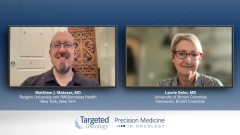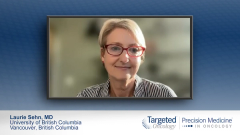
Relapsed/Refractory Follicular Lymphoma: Second-Line Treatment Armamentarium
Matthew Matasar, MD and Laurie Sehn, MD, share insight on available therapies for relapsed or refractory follicular lymphoma and reflect on factors that help in treatment selection.
Episodes in this series

Transcript:
Matthew J. Matasar, MD: Regardless of first-line treatment, whether it’s chemo-immunotherapy, with or without maintenance, or customized monotherapy, these challenges are going to be doubled when you’re trying to manage a patient with relapsed or refractory disease. How do you approach that decision-making? Obviously there’s a lot of nuance that goes into it, including incorporating what the first-line therapy was, what the duration of benefit was, and the relapse pattern. Maybe you could help us understand your approach to a patient with relapsed follicular lymphoma.
Laurie Sehn, MD: That is an area where I would say we really don’t have a current standard of care. I think in the upfront setting, chemo-immunotherapy still would be considered the frontline standard of care. We know that chemotherapy has been around for a long time for follicular lymphoma. We’ve got a number of options such as CHOP [cyclophosphamide, hydroxydaunorubicin, vincristine sulfate, and prednisone] and now bendamustine. What we did learn was that adding a CD20 monoclonal antibody in the upfront setting improved the overall survival for these patients, which, of course, made anti-CD20 and chemotherapy the upfront standard of care. And then, as we talked about, the option to continue the anti-CD20 maintenance for the improvement and progression-free survival.
But beyond that, I think most of us are hoping to see a future where we’re relying more on targeted therapies and nonchemotherapy-based approaches. Unfortunately, in the 1 trial where it looked like we might be replacing chemotherapy on the frontline setting, the RELEVANCE trial, which actually compared R2 [lenalidomide and rituximab] against a chemo-immunotherapy approach upfront, that trial, which was designed to prove superiority of the R2 approach, unfortunately didn’t prove superiority. So it was considered a negative trial and therefore did not come out as an approved treatment in the frontline setting based on the data. But what we clearly learned from that trial was that it was a very effective treatment for patients with follicular lymphoma, and the curves were virtually superimposable. So the results from frontline chemo-immunotherapy vs R2 were quite comparable from the RELEVANCE trial.
As I said, there wasn’t enough from that trial to earn an indication in that setting, and I suppose that if a patient was not a chemotherapy candidate, it would be the alternative that we would want to use upfront. Having said that, in the relapsed/refractory setting I think it’s become probably the most popular choice, based on the data that we’ve seen not only from the RELEVANCE trialupfront, but based on data that’s also been shown in the relapsed/refractory setting. So my tactic for the patient in the second-line setting would be probably to move away from chemo-immunotherapy, and I think R2 is kind of the logical contender in the second-line setting.
The one caveat is that not all patients with relapsed/refractory disease are created equal. We now recognize that there’s about 15%-20% of patients who have either primary refractory disease, or progression within 24 months of initial diagnosis. Clearly, these patients have higher risk disease. We often refer to them as the POD 24, progression of disease within 24 months population. And I think that 15%-20% of patients, we’re not really sure what to do with in the second-line setting. There’s some data to suggest that, because of their disease refractoriness, they may benefit from early transplant, such as an autologous stem cell transplant, but I think the data is still not really firm. We don’t have randomized data, for example, to guide what to do with that patientpopulation, and I think it does beg the question, should we go down a more aggressive route or not? I’m still a little bit on the fence in my own clinic on what to do with that patient population.
Matthew J. Matasar, MD: I agree with you, and while we do know that overall the patients who experience POD 24, as a group, have inferior outcomes, I think that is partially explained by occult or undiagnosed transformation. And if you can rigorously exclude transformation from patients experiencing early relapse, it’s not as clear that their outcomes are as inferior. Those are patients that are likely to be less sensitive to chemotherapy in the second line and may benefit from either lenalidomide-based treatment, or other novel approaches, as opposed to trying another cytotoxic treatment. But I also share your uncertainty about obligatory transplant.
Laurie Sehn, MD: I agree. In my own clinic, I do just that. I make sure there isn’t an underlying transformation to explain the early progression. The data would suggest that as many as 50%-70% of patients may actually harbor a transformation. So going down a more aggressive route of alternative salvage therapy and autologous stem cell transplant would be appropriate and reasonable in that case. But if you can really exclude transformation, I do agree that pushing more chemotherapy on those patients is probably not in their best interest, but rather going to alternative targeted therapies would be more appropriate.
Matthew J. Matasar, MD: For me, that’s even more the case, because now we have a growing armamentarium of options for third-line patients. Knowing that you have options to turn to with a second relapse certainly takes a little bit of the pressure off, in terms of trying to be maximally aggressive in that second-line setting and putting patients at risk for complications from another transplant.
Transcript edited for clarity.










































